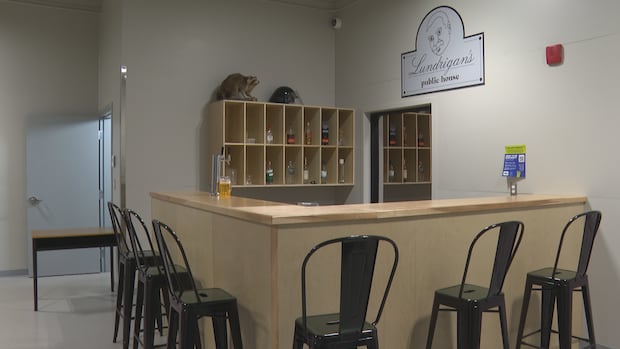PEI·NewSoon-to-be public safety officers in P.E.I. have a new way to train, in a facility that provides immersive learning in real-world situations. The Atlantic Police Academy has opened the new state-of-the-art Atlantic Tactical Training & Innovation Centre (ATTIC). ‘The purpose… is to increase the reality in reality-based training,’ says executive directorRyan McKellop · CBC News · Posted: Nov 18, 2025 5:00 AM EST | Last Updated: 29 minutes agoListen to this articleEstimated 4 minutesThe audio version of this article is generated by text-to-speech, a technology based on artificial intelligence.’I think it’s very important reality-based training. It’s the opportunity for our cadets to put into practice all the theory that they’re learning,’ says Jeff Minten, executive director of the Atlantic Police Academy, of the new Atlantic Tactical Training and Innovation Centre. (Stacey Janzer/CBC)Soon-to-be public safety officers in P.E.I. have a new way to train, in a facility that provides immersive learning in real-world situations.The Atlantic Police Academy has opened the new state-of-the-art Atlantic Tactical Training & Innovation Centre (ATTIC), which features scenario rooms including a mock café, bar, and apartment. There is also a virtual reality range, along with an augmented and virtual reality training system, meant to give cadets experience through scenarios that mirror challenges faced on the job.”The purpose of ATTIC is to increase the reality in reality-based training,” said Jeff Minton, executive director of the Atlantic Police Academy.The facility is around 6,200 square feet and cost approximately $5 million, with funding from both the province and the Atlantic Canada Opportunities Agency. Minten said the scenario rooms are meant to simulate possible calls cadets may go on.”Within the room itself, we have cameras in every corner that lets us bring this training back into a classroom,” he said.”We can have students in the classroom watching what’s going on and learning at the same time, without interrupting or interfering with the training in this room.”The new Atlantic Tactical Training & Innovation Centre includes a mock bar, where cadets will get hands-on experience in scenario-based training. (Stacey Janzer/CBC)Minten said it’s an important opportunity for cadets to put into practice the theory they’re learning.He noted that when he was starting out, training relied much more on imagination. “Reality-based training, or scenario-based training, has been around for a while, but not having an environment like this. There was a lot of imagination,” he said.”We would be in an empty warehouse and you know, you would respond to a [simulated] domestic call, so it wasn’t really real. You’re using… your imagination and because of that the training isn’t as effective.”Scenario rooms to be used by more than just police cadetsPolice cadets won’t be the only ones to use these scenario rooms.”We have a room for the fire hall with breaching doors and standpipes and hose connections where they can practice some of their skills there,” Minten said. Helen Stoney, a fire cadet trained in the new facility, said it was a nice to get hands-on experience.Fire cadet Helen Stoney says the scenario rooms are a good way to get hands-on experience. (Stacey Janzer/CBC)”It was really nice to have a space where we were able to do the hands-on work, while being here at the [Atlantic Police Academy]. It was really nice to sort of break up those classroom sessions.”Stoney said the scenario rooms were quite immersive.”Especially with our search simulator, there’s a room in there where it’s set up like an apartment and we go around and search it as if we would in a real fire scenario,” she said.”It’s nice to kind of get that hands on experience, and you learn about the proper search techniques in a very controlled environment, instead of going into a burning building and just doing it for the first time.”Stoney said that another part of her training in this new facility involves forcible entry.”We have this special door that we use. We can set it up in various different ways. We can practice forcing entry on an inward swinging door, outward swinging door,” she said.”We learn all the different techniques for you know, your regular residential doors, or your industrial doors.”Preventing injuries while trainingJordan Haines, a police science cadet, said the scenario rooms are made up of furniture and appliances that are made with soft materials to prevent training injuries.Jordan Haines, a police science cadet, says the scenario room featuring soft furniture and appliances allows cadets to practice apprehending suspects without injuring themselves. (Stacey Janzer/CBC)”The stove, the fridge is all soft. If we… go to a domestic, we can apprehend the subject properly, [learn] how to do it properly — without getting injured.”Another component of the training is technology that simulates scenarios where trainees get shot at or stabbed by suspects. “It gives you like a shock,” Haines said. Haines said it has been an effective way to learn. “It kind of gets you to get into cover properly… I don’t like electricity, and definitely gunshots, so it’s something you learn and improve your ability.”With files from Stacey Janzer
New tactical training facility aims to train P.E.I. public safety officers in realistic environments











